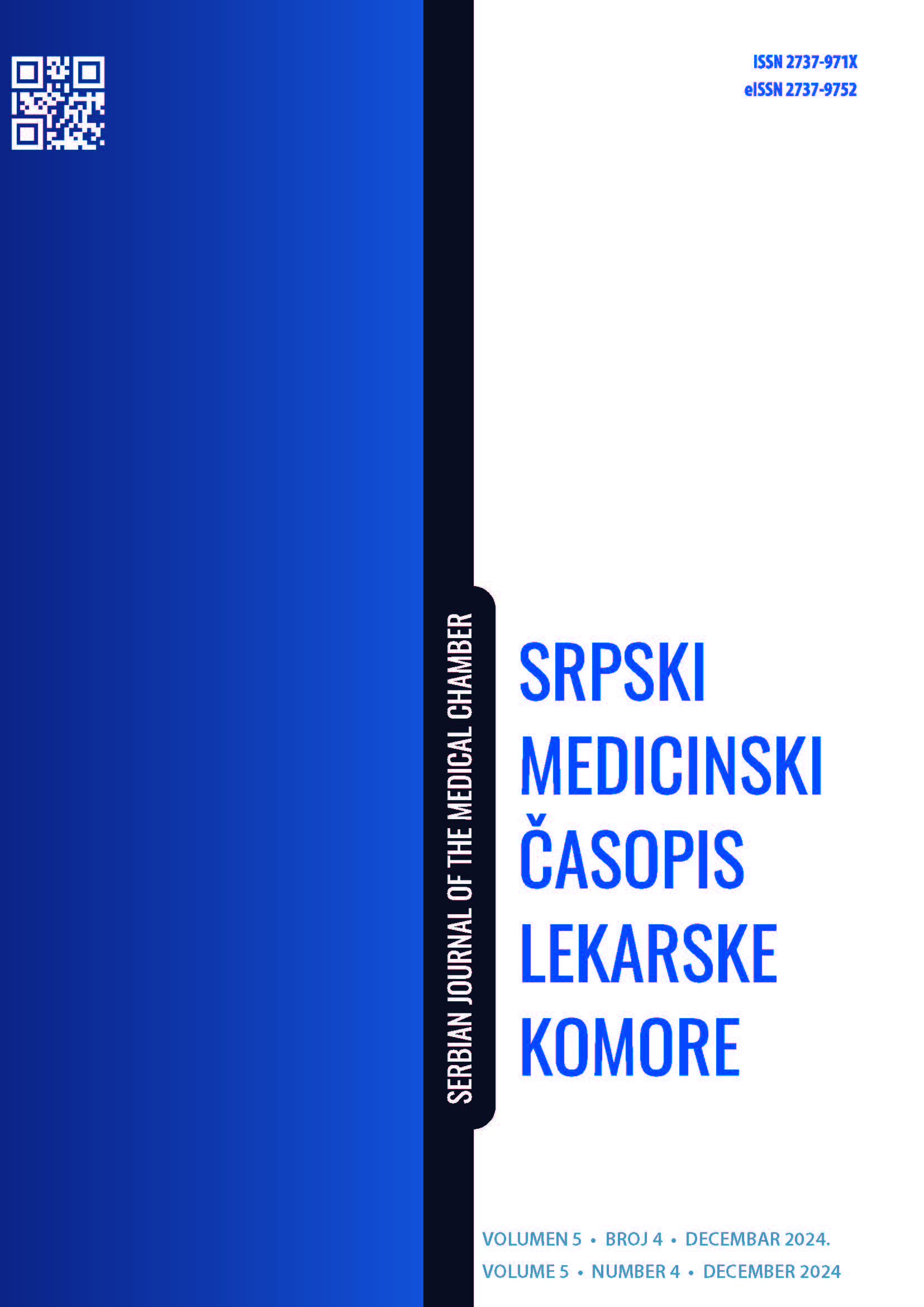ASSESSING PSYCHOMETRIC PROPERTIES OF THE SERBIAN VERSION OF THE METACOGNITIVE AWARENESS INVENTORY (MAI)
Abstract
Introduction: Metacognition, which refers to the ability to monitor and regulate one’s cognitive processes, plays a crucial role in medical education. Evaluating metacognitive awareness is particularly important for university students, as it impacts their learning strategies and academic performance. The study aimed to examine the psychometric characteristics of the Serbian adaptation of the Metacognitive Awareness Inventory (MAI), emphasizing its construct validity and internal consistency.
Materials and methods: This cross-sectional study was conducted with third-year medical students of the University of Belgrade Faculty of Medicine, in October 2024. The psychometric properties of the Serbian version of the MAI were evaluated by assessing its factorial structure and internal consistency. The MAI consists of 52 items, comprising two primary components: ‘Knowledge of Cognition’ and ‘Regulation of Cognition’. The subcomponents of the ‘Knowledge of Cognition" component were declarative knowledge, procedural knowledge, and conditional knowledge, whereas the subcomponents of the ‘Regulation of Cognition’ component were: planning, information management strategies, comprehension monitoring, debugging strategies, and evaluation.
Results: A total of 426 medical students were included in the study. The mean age of the respondents was 21.3±1.4 years, and the majority were females (68.5%). The mean score on the scale was 199.0. The internal consistency analysis of the Serbian version of the MAI questionnaire yielded a Cronbach’s α of 0.94, and a McDonald's ω of 0.95 for the entire scale, which indicates excellent scale reliability. The Serbian version of the MAI questionnaire was validated using confirmatory factor analysis, supporting both the hypothesized eight-factor and two-factor structures. The eight-factor model showed good fit indices (IFI = 0.908, CFI = 0.905, RMSEA = 0.042), with statistically significant factor loadings (p < 0.05). Similarly, the two-factor model demonstrated an adequate fit (IFI = 0.921, CFI = 0.918, RMSEA = 0.039), with all loadings also being significant (p < 0.05).
Conclusion: The present study revealed that the Serbian version of the MAI is a reliable and valid tool for assesment medical students’ metacognitive awareness.
References
Gündüz A, Gündoğmuş İ, Engin B, Bağlar G, Gündüz EBU. The validity and reliability of the Turkish version of the Meta-Worry Questionnaire. Noro Psikiyatr Ars. 2022 Aug 24;59(3):218-25. doi: 10.29399/npa.27926.
Schraw G, Sperling Dennison R. Assessing Metacognitive Awareness. Contemporary Educational Psychology. 1994; 19 (4): 460-75.
Flavell JH. Metacognition and cognitive monitoring: A new area of cognitive–developmental inquiry. Am Psychol. 1979 Oct;34(10):906-11. doi: 10.1037/0003-066X.34.10.906.
Livingston JA. Metacognition: an overview. 2003. [Internet]. Available from: https://files.eric.ed.gov/fulltext/ED474273.pdf
Metcalfe J, Shimamura APS. Metacognition. Knowing about knowing. Cambridge (MA), Bradford Book, Massachusetts Institute of Technology. 1994. doi: 10.7551/mitpress/4561.001.0001.
Schraw G, Moshman D. Metacognitive theories. Educational Psychology Review. 1995 Dec;7(4):351-71.
Dunlap, JC. Problem-based learning and self-efficacy: How a capstone course prepares students for a profession. ETR&D. 2005 Mar;53:65-83. doi: 10.1007/BF02504858.
Maudsley G, Strivens J. 'Science', 'critical thinking' and 'competence' for tomorrow's doctors. A review of terms and concepts. Med Educ. 2000 Jan;34(1):53-60. doi: 10.1046/j.1365-2923.2000.00428.x.
Molenaar I, Sleegers P, van Boxtel C. Metacognitive scaffolding during collaborative learning: a promising combination. Metacognition Learn. 2014 Jul 17;9:309-32. doi: 10.1007/s11409-014-9118-y.
Smith JM, Mancy R. Exploring the relationship between metacognitive and collaborative talk during group mathematical problem-solving – what do we mean by collaborative metacognition? Res Math Educ. 2018;20(1):14-36. doi: 10.1080/14794802.2017.1410215.
Akin A, Abaci R, Çetin B. The validity and reliability of the Turkish version of the Metacognitive Awareness Inventory. Educ Sci: Theory Pract. 2007 May;7(2):671-8.
Wild D, Grove A, Martin M, Eremenco S, McElroy S, Verjee-Lorenz A, et al.; ISPOR Task Force for Translation and Cultural Adaptation. Principles of Good Practice for the Translation and Cultural Adaptation Process for Patient-Reported Outcomes (PRO) Measures: report of the ISPOR Task Force for Translation and Cultural Adaptation. Value Health. 2005 Mar-Apr;8(2):94-104. doi: 10.1111/j.1524-4733.2005.04054.x.
Gutierrez de Blume AP, Montoya Londoño DM, Jiménez Rodríguez V, Morán Núñez O, Cuadro A, Daset L, et al. Psychometric properties of the Metacognitive Awareness Inventory (MAI): standardization to an international spanish with 12 countries. Metacognition Learn. 2024 Jun 24;9:793-825. doi: 10.1007/s11409-024-09388-9.
Omprakash A, Kumar AP, Kuppusamy M, Sathiyasekaran BWC, Ravinder T, Ramaswamy P. Validation of Metacognitive Awareness Inventory from a Private Medical University in India. J Educ Health Promot. 2021 Sep 30;10:324. doi: 10.4103/jehp.jehp_39_21.
Craig K, Hale D, Grainger C, Stewart ME. Evaluating metacognitive self-reports: systematic reviews of the value of self-report in metacognitive research. Metacognition Learn. 2020 May 9;15:155-213. doi: 10.1007/s11409-020-09222-y.
Li S, Xu J, Jia X, Zhao Y, Liu X, Wang Y. Translation and psychometric validation of the Chinese version of the metacognitive awareness scale among nursing students. Front Psychol. 2024 May 16;15:1354810. doi: 10.3389/fpsyg.2024.1354810.
Tavakol M, Dennick R. Making sense of Cronbach's alpha. Int J Med Educ. 2011 Jun 27;2:53-5. doi: 10.5116/ijme.4dfb.8dfd.
McDonald RP. Test theory: a unified treatment. Mahwah, NJ: Lawrence Erlbaum Associates. 1999.
Hayes AF, Coutts JJ. (2020). Use Omega rather than Cronbach’s alpha for estimating reliability. But…. Commun. Methods Meas. 2020 Feb 11;14(1):1-24. doi: 10.1080/19312458.2020.1718629.

